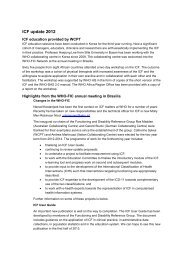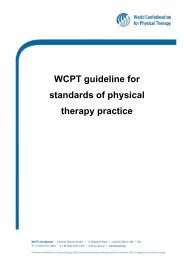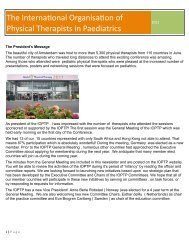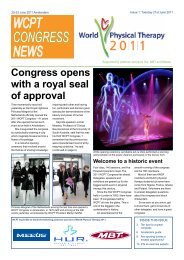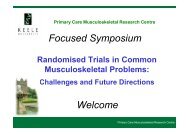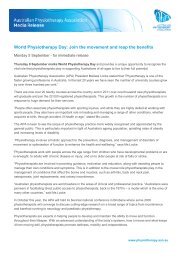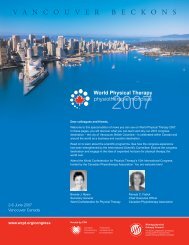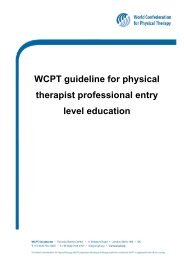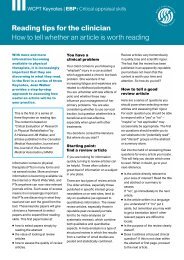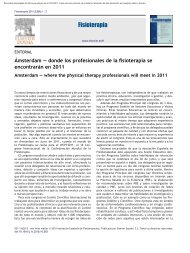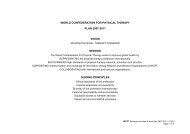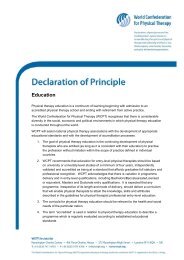wcpt congress: event of a lifetime - World Confederation for Physical ...
wcpt congress: event of a lifetime - World Confederation for Physical ...
wcpt congress: event of a lifetime - World Confederation for Physical ...
Create successful ePaper yourself
Turn your PDF publications into a flip-book with our unique Google optimized e-Paper software.
HEALTH AND DISABILITY<br />
Developments in the health<br />
and disability sector<br />
Health Equity:<br />
the Marmot symposium<br />
Karen and I were <strong>for</strong>tunate to attend<br />
the Marmot symposium in Wellington<br />
in July, the key speaker being<br />
Sir Michael Marmot who has led a<br />
research group on health inequalities<br />
<strong>for</strong> the past 30 years.<br />
His two landmark publications are the<br />
2008 WHO report ‘Closing the gap in<br />
a generation: Health equity through<br />
action on the social determinants <strong>of</strong><br />
health’ and the 2010 review in England<br />
‘Fair Society, Healthy Lives’ following<br />
an independent review into health<br />
inequalities in England.<br />
The seminar was opened by the Hon<br />
Tony Ryall, Minister <strong>of</strong> Health who gave<br />
a brief overview <strong>of</strong> the government<br />
health strategy. Un<strong>for</strong>tunately he had<br />
to leave following his presentation,<br />
thus missing the wide-ranging<br />
presentations and discussions during<br />
the afternoon.<br />
The seminar and Sir Michael’s visit were<br />
jointly sponsored by the New Zealand<br />
Medical Association to coincide with<br />
the release <strong>of</strong> their position statement<br />
on “Health Equity” available on http://<br />
www.nzma.org.nz/sites/all/files/<br />
HealthEquity.pdf. Dr Don Simmers from<br />
the NZMA talked about its inception<br />
giving graphic examples <strong>of</strong> health<br />
inequalities from two areas he had<br />
worked, Queenstown and the suburb<br />
<strong>of</strong> Newtown in Wellington.<br />
All <strong>of</strong> his points (listed right) were aptly<br />
demonstrated with examples from<br />
the UK and around the world. The<br />
next session involved six New Zealand<br />
speakers whose research supported<br />
the messages Sir Michael had made,<br />
providing New Zealand examples.<br />
• Pr<strong>of</strong>essor Philippa Howden-Chapman<br />
on her ground-breaking work into<br />
housing and health inequality in<br />
New Zealand<br />
• Economist Pr<strong>of</strong>essor Don Matheson<br />
bemoaning our obsession with<br />
growing GDP and our habit <strong>of</strong><br />
continually comparing our growth to<br />
that <strong>of</strong> Australia<br />
• Associate Pr<strong>of</strong>essor Paparangi Reid<br />
on the ongoing effects <strong>of</strong> colonialism<br />
on health inequalities <strong>for</strong> Maori<br />
• A Pacific perspective by Dr Debbie<br />
Ryan and Dr Ineke Meredith who<br />
discussed the success <strong>of</strong> pacific<br />
island health initiatives<br />
• Dr Russell Willis, Commissioner <strong>for</strong><br />
Children who talked <strong>of</strong> the<br />
importance <strong>of</strong> children’s health<br />
as a national priority and the recent<br />
progress on immunisation rates and<br />
the B4 School checks<br />
• Pr<strong>of</strong>essor Norman Sharpe from the<br />
Heart Foundation on our appalling<br />
rate <strong>of</strong> rheumatic fever, generally<br />
caused by poor housing<br />
• Michael Chen-Xu from the Medical<br />
Students Association who gave an<br />
impassioned speech on the need<br />
<strong>for</strong> change otherwise their generation<br />
would not be able to deliver<br />
equitable and effective healthcare.<br />
It was a thought-provoking afternoon,<br />
challenging everyone to do things<br />
differently in the future.<br />
Powerpoints <strong>of</strong> all presentations are on<br />
http://www.uow.otago.ac.nz/academic/<br />
dph/research/HIRP/index.html<br />
There is a related NZMJ editorial<br />
- Blakely T, Simmers D, Sharpe<br />
N. New Zealand Medical Journal,<br />
2011;124(1338) on Inequities in<br />
Health and the Marmot Symposia:<br />
time <strong>for</strong> a stocktake.<br />
Janet Copeland<br />
Policy and Research Advisor<br />
The key messages from Sir Michael’s presentation were:<br />
1. Reducing health inequalities is a matter <strong>of</strong> fairness and social justice<br />
2. There is a social gradient in health – the worse a person’s social position,<br />
the worse his or her health<br />
3. Focusing solely on the most disadvantaged will not reduce health<br />
inequalities sufficiently – action must be universal but with a scale and<br />
intensity proportionate to the level <strong>of</strong> disadvantage<br />
4. Action taken to reduce health inequalities will benefit society in many ways<br />
5. Economic growth is not the most important measure <strong>of</strong> a country’s success<br />
6. Reducing health inequalities will require action on six policy objectives:<br />
- Give every child the best start in life<br />
- Enable everyone to maximise their capabilities and have control<br />
over their lives<br />
- Create fair employment and good work <strong>for</strong> all<br />
- Ensure healthy standards <strong>of</strong> living <strong>for</strong> all<br />
- Create healthy and sustainable communities<br />
- Strengthen the role and impact <strong>of</strong> health pr<strong>event</strong>ion<br />
7. Delivering these objectives will require action from everyone from<br />
the government down<br />
8. Effective local delivery requires effective participatory decision making<br />
at local level<br />
10 | PHYSIO MATTERS AUGUST 2011



